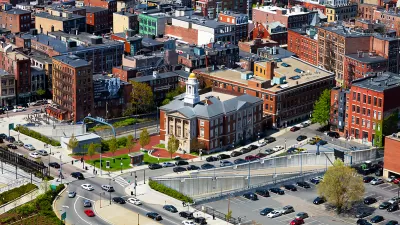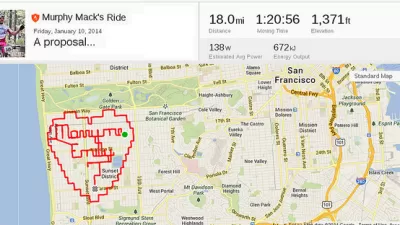Two planning researchers, one a professor at Tufts and another independent, make the case against apps as a panacea for urban problems.

Julian Agyeman and Duncan McLaren write a dissenting take on the trend of cities seeking the latest in "smart city" technology. According to their argument, "our current smart-city techno fetish rides roughshod across the public realm." Moreover, it "encourages the belief that there’s always 'an app for that' — that we can address deep-seated, structural urban problems through business-led technological innovation and somehow sidestep the messiness of inclusive politics."
As evidence to back up those claims, Agyeman and McLaren first cite the example of a partnership between the city of Boston and Waze, the Google-owned navigation app (not to be confused with the city of Boston's partnership with Uber, which has been the subject of recent criticisms). Despite seeming like a great idea, according to Agyre, and McLaren, the partnership with Waze "merely represents a Band Aid slapped over a problem that still requires brave new political thinking and much-needed infrastructure investment." Agyeman and McLaren's response to the problems of congestion would employ congestion pricing and transit investments, rather than relying on the effects of Waze's data-collection system.
FULL STORY: Apps don’t make a city smart

Planetizen Federal Action Tracker
A weekly monitor of how Trump’s orders and actions are impacting planners and planning in America.

Chicago’s Ghost Rails
Just beneath the surface of the modern city lie the remnants of its expansive early 20th-century streetcar system.

San Antonio and Austin are Fusing Into one Massive Megaregion
The region spanning the two central Texas cities is growing fast, posing challenges for local infrastructure and water supplies.

Since Zion's Shuttles Went Electric “The Smog is Gone”
Visitors to Zion National Park can enjoy the canyon via the nation’s first fully electric park shuttle system.

Trump Distributing DOT Safety Funds at 1/10 Rate of Biden
Funds for Safe Streets and other transportation safety and equity programs are being held up by administrative reviews and conflicts with the Trump administration’s priorities.

German Cities Subsidize Taxis for Women Amid Wave of Violence
Free or low-cost taxi rides can help women navigate cities more safely, but critics say the programs don't address the root causes of violence against women.
Urban Design for Planners 1: Software Tools
This six-course series explores essential urban design concepts using open source software and equips planners with the tools they need to participate fully in the urban design process.
Planning for Universal Design
Learn the tools for implementing Universal Design in planning regulations.
planning NEXT
Appalachian Highlands Housing Partners
Mpact (founded as Rail~Volution)
City of Camden Redevelopment Agency
City of Astoria
City of Portland
City of Laramie



























